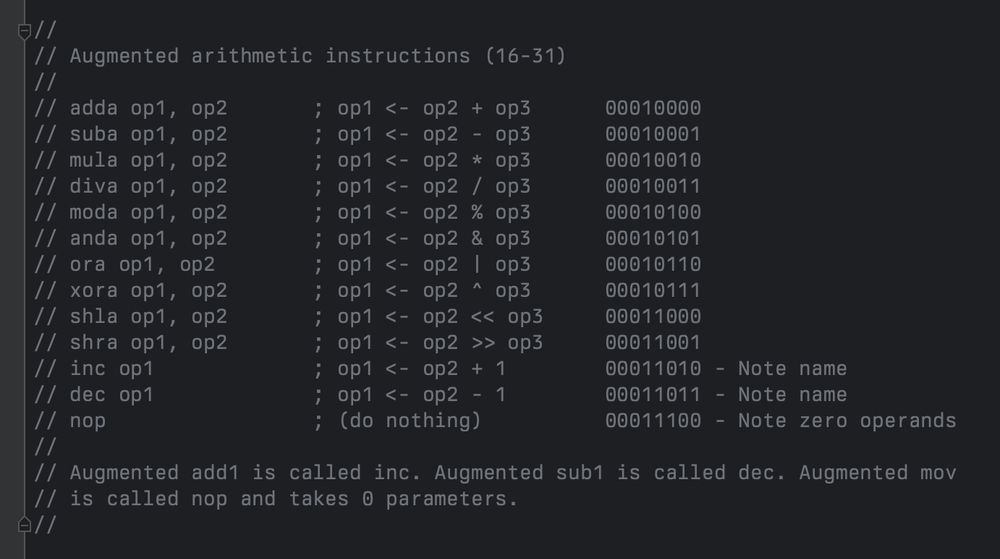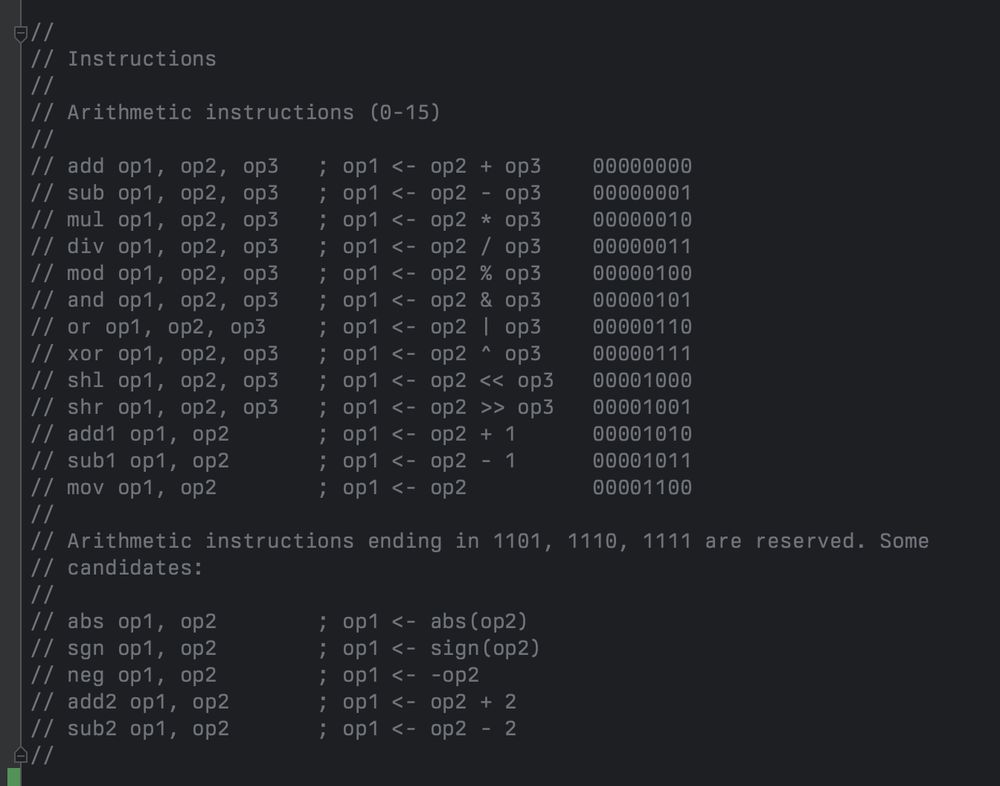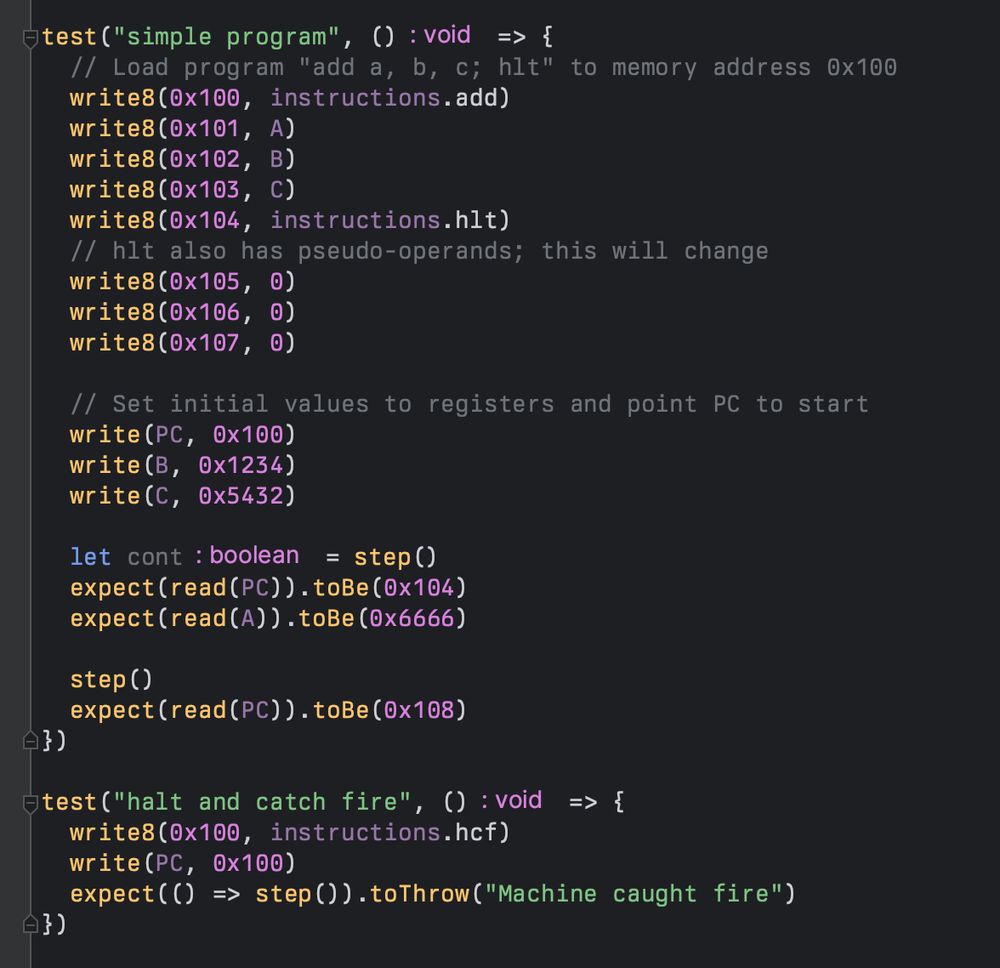
![List of test instructions that ChatGPT wrote me.
export const opcodes: { [key: number]: string } = {
0b00000000: "add", // add <op1> <op2> <op3> - op1 <- op2 + op3
0b00000001: "sub", // sub <op1> <op2> <op3> - op1 <- op2 - op3
0b00000010: "mul", // mul <op1> <op2> <op3> - op1 <- op2 * op3
// etc, ending with 0b00001100: "mov"
0b00010000: "adda", // add <op1> <op2> - op1 <- op1 + op2
0b00010001: "suba", // sub <op1> <op2> - op1 <- op1 - op2
0b00010010: "mula", // mul <op1> <op2> - op1 <- op1 * op2
// etc, ending with 0b00011100: "nop"
0b11110000: "hlt", // hlt <?> <?> <?> - halt program execution
0b11110001: "hcf", // hcf <?> <?> <?> - halt and catch fire
}](https://cdn.bsky.app/img/feed_thumbnail/plain/did:plc:ih3rt6r3sesh2flndp7oefwc/bafkreigk2zydmtc4l3i6wylscfxi32i4miznksorfkn7imorfwcufcoptu@jpeg)



Instructions that logically take only 1 argument don't make sense, such as INC/DEC, and some potential ones like NEG, NOT, CLR. Except for MOV.

Instructions that logically take only 1 argument don't make sense, such as INC/DEC, and some potential ones like NEG, NOT, CLR. Except for MOV.

Note that mov is considered one of the arithmetic opcodes (it's similar in structure to e.g. neg, just does nothing)

Note that mov is considered one of the arithmetic opcodes (it's similar in structure to e.g. neg, just does nothing)
![export const opcodes: { [key: number]: string } = {
0b00000000: "add", // add <dst> <src1> <src2> - dst <- src1 + src2
0b00000001: "sub", // sub <dst> <src1> <src2> - dst <- src1 - src2
0b11110000: "hlt", // hlt <?> <?> <?> - halt program execution
0b11110001: "hcf", // hcf <?> <?> <?> - halt and catch fire
}](https://cdn.bsky.app/img/feed_thumbnail/plain/did:plc:ih3rt6r3sesh2flndp7oefwc/bafkreiaxbd544s5ivci5g2fpozpdlsi7pjhntbnttldzrrue5mewnnq734@jpeg)
![// Write 8-bit unsigned byte `byte` to memory address `addr`, or `more` after
// that if provided
export function write8(addr: number, byte: number, ...more: Array<number>) {
if (byte < 0 || byte >= 256) {
error(`write8: byte doesn't fit ${byte}`)
}
if (addr < 0 || addr >= MEM_SIZE) {
error(`write8: invalid address ${addr}`)
}
mem[addr] = byte
if (more.length) {
for (let i = 0; i < more.length; i++) {
mem[addr + i + 1] = more[i]
}
}
}](https://cdn.bsky.app/img/feed_thumbnail/plain/did:plc:ih3rt6r3sesh2flndp7oefwc/bafkreigwow5jxuvzhnqcftrlk6zjzw6hsvsnmd7mwjr6ah7p6dgjpngedu@jpeg)


![export function step(): boolean {
let pc: number = registers.pc
log(`step: pc ${print(pc)}`)
let opcode: number = read8(pc++)
let instr: string = opcodes[opcode] ?? "nop"
let op1: number = read8(pc++)
let op2: number = read8(pc++)
let op3: number = read8(pc++)
registers.pc = pc
let op2value = readOperand(op2)
let op3value = readOperand(op3)
log(
`step: instr ${instr} ${print(opcode)} ${print(op1)} ${print(op2)} ${print(
op3,
)}`,
)
if (instr === "add") {
let result = op2value + op3value
writeOperand(op1, result)
return true
}
if (instr === "hlt") {
return false
}
if (instr === "hcf") {
error("Machine caught fire")
}
return true
}](https://cdn.bsky.app/img/feed_thumbnail/plain/did:plc:ih3rt6r3sesh2flndp7oefwc/bafkreib24n3wuh6irmidbqbswcvfmicmm5vpa74rmiojs5vhhkiqom4i3u@jpeg)

![export function read8s(addr: number) {
if (addr < 0 || addr >= MEM_SIZE) {
error(`read8: invalid address ${addr}`)
}
let result = mem[addr]
if ((result & 0b1000_0000) > 0) {
// Sign-extend
return result | 0xffffff00
} else {
return result
}
}](https://cdn.bsky.app/img/feed_thumbnail/plain/did:plc:ih3rt6r3sesh2flndp7oefwc/bafkreifpdwxj7ljuqbxswblyonloj4fulgmihqfkqbzog5nvkktbt4thsq@jpeg)


![✓ jump relative with add [0.03ms]
step: pc 0x0100
step: instr add (0x0000)
step: pc 0x0104
step: instr hlt (0x00f0)
✓ program with byte addressing [0.08ms]](https://cdn.bsky.app/img/feed_thumbnail/plain/did:plc:ih3rt6r3sesh2flndp7oefwc/bafkreifxbpguyl2iwhd7q26igbghvjjxea5h6kuyqhsfh4sqhdkkgowmli@jpeg)


![Operand format:
Direct addressing (word), values 0..63:
00mmmmmm: [M], where M is number 0-63
Direct addressing (byte), values 64..127:
01mmmmmm: [M].b, where M is number 0-63
Indirect addressing with immediate offset (word), values 128..175:
10ooooaa: [<rega> + O], where <rega> is selected with bits 'aa' and O is
the range 0b0000-0b1011, represented by bits 'oooo', mapped to values -6 to 5
Indirect addressing with index register (word), values 176..191:
1011iiaa: [<rega> + <regi>], where <rega> is selected with bits 'aa' and
<regi> is selected with bits 'ii'
Indirect addressing with immediate offset (byte), values 192..239:
11ooooaa: [<rega> + O].b, where <rega> is selected with bits 'aa' and O is
range 0b0000-0b1011 mapped to values -6 to 5
Indirect addressing with index register (byte), values 240..255:
1111iiaa: [<rega> + <regi>].b, where <rega> is selected with bits 'aa' and
<regi> is selected with bits 'ii'](https://cdn.bsky.app/img/feed_thumbnail/plain/did:plc:ih3rt6r3sesh2flndp7oefwc/bafkreih3zx7t3wq6w3pkopewejmdrb52v773w6aqxjls7f7degsewkj6ba@jpeg)
![Syntax
[M] means the word at memory address M.
[M].b means the byte at memory address M. When read, it is sign-extended
to a word.
<reg> is equivalent to [addressof <reg>], where <reg> is one of registers
(a, b, c, d, x, y, i, j, p, q, sp, pc), and addressof <reg> is the memory
address of the register according to the table below.
<reg>.hi is equivalent to [address of <reg>].b
<reg>.lo is equivalent to [address of <reg> + 1].b
Table of registers and their addresses:
a: 0x0 a.hi: 0x0 a.lo: 0x1
b: 0x2 b.hi: 0x2 b.lo: 0x3
c: 0x4 c.hi: 0x4 c.lo: 0x5
d: 0x6 d.hi: 0x6 d.lo: 0x7
x: 0x8 x.hi: 0x8 x.lo: 0x9
y: 0xa y.hi: 0xa y.lo: 0xb
i: 0xc i.hi: 0xc i.lo: 0xd
j: 0xe j.hi: 0xe j.lo: 0xf
p: 0x10 p.hi: 0x10 p.lo: 0x11
q: 0x12 q.hi: 0x12 q.lo: 0x13
sp: 0x14 sp.hi: 0x14 sp.lo: 0x15
pc: 0x16 pc.hi: 0x16 pc.lo: 0x17
Finally:
<regi> is one of x, y, i, j
<rega> is one of p, q, sp, pc](https://cdn.bsky.app/img/feed_thumbnail/plain/did:plc:ih3rt6r3sesh2flndp7oefwc/bafkreihgoilh3oo5wjtu76jpvjf6cyjdj42fqfy7bg6gxysyg7nwxhkcqi@jpeg)


![export const opcodes: { [key: number]: string } = {
0b00000000: "add", // add <dst> <src1> <src2> - dst <- src1 + src2
0b11110000: "hlt", // hlt <?> <?> <?> - halt program execution
0b11110001: "hcf", // hcf <?> <?> <?> - halt and catch fire
}
// Reverse mapping of opcodes (to make it easier to write programs)
export const instructions: { [opcode: string]: number } = {}
for (let opcode in opcodes) {
instructions[opcodes[opcode]] = Number(opcode)
}
// Read and execute one instruction at pc. Returns false if machine halted
export function step(): boolean {
let pc: number = registers.pc
let opcode: number = read8(pc++)
let instr: string = opcodes[opcode] ?? "nop"
let op1: number = read8(pc++)
let op2: number = read8(pc++)
let op3: number = read8(pc++)
registers.pc = pc
if (instr === "add") {
write(op1, read(op2) + read(op3))
return true
}
if (instr === "hlt") {
return false
}
if (instr === "hcf") {
error("Machine caught fire")
}
return true
}](https://cdn.bsky.app/img/feed_thumbnail/plain/did:plc:ih3rt6r3sesh2flndp7oefwc/bafkreifxzvxeto3qul3locbravtqaez4nq57yoo2z5xrzt5mxuiqlm4j3m@jpeg)
![// Write 16-bit big endian signed word `word` to memory address `addr`
export function write(addr: number, word: number) {
if (word < -32768 || word > 32767) {
// Alternatively, we might just do `& 0xffff` and be done with it
error(`write: word doesn't fit ${word}`)
}
let hi = (word & 0xff00) >> 8
let lo = word & 0x00ff
if (addr < 0 || addr >= MEM_SIZE - 1) {
if (addr === MEM_SIZE - 1) {
mem[addr] = hi
mem[0] = lo
} else {
error(`write: invalid address ${addr}`)
}
}
mem[addr] = hi
mem[addr + 1] = lo
}
// Write 8-bit unsigned byte `byte` to memory address `addr`
export function write8(addr: number, byte: number) {
if (byte < 0 || byte >= 256) {
error(`write8: byte doesn't fit ${byte}`)
}
if (addr < 0 || addr >= MEM_SIZE) {
error(`write8: invalid address ${addr}`)
}
mem[addr] = byte
}](https://cdn.bsky.app/img/feed_thumbnail/plain/did:plc:ih3rt6r3sesh2flndp7oefwc/bafkreiedxra5bp4jfnsq66bgfjowmryant5e2sc55nog6wmlrcy22lwfue@jpeg)
![test("read byte from memory", () => {
mem[0] = 0x44
mem[1] = 0xff
expect(read8(0)).toBe(0x44)
// Note: not negative, bytes are always unsigned
expect(read8(1)).toBe(0xff)
})
test("write byte to memory", () => {
write8(0, 0x33)
write8(0xffff, 0xff)
expect(mem[0]).toBe(0x33)
expect(mem[0xffff]).toBe(0xff)
expect(() => write8(0, -1)).toThrow()
expect(() => write8(0, 256)).toThrow()
})](https://cdn.bsky.app/img/feed_thumbnail/plain/did:plc:ih3rt6r3sesh2flndp7oefwc/bafkreifdh6l37duq2sroi2nj2ev4c5wd2ldbmmqauxbblu23ug3cl4kxdm@jpeg)

![export function write(addr: number, num: number) {
if (num < -32768 || num > 32767) {
// Alternatively, we might just do `& 0xffff` and be done with it
error(`write: number doesn't fit ${num}`)
}
let hi = (num & 0xff00) >> 8
let lo = num & 0x00ff
if (addr < 0 || addr >= MEM_SIZE - 1) {
if (addr === MEM_SIZE - 1) {
mem[addr] = hi
mem[0] = lo
} else {
error(`write: invalid address ${addr}`)
}
}
mem[addr] = hi
mem[addr + 1] = lo
}](https://cdn.bsky.app/img/feed_thumbnail/plain/did:plc:ih3rt6r3sesh2flndp7oefwc/bafkreid2l4oewhztdlqymwanht77wfjj5fu6ou6e22czuuzultakh2hb5a@jpeg)

![export function read(addr: number) {
let data
if (addr < 0 || addr >= MEM_SIZE - 1) {
if (addr === MEM_SIZE - 1) {
data = (mem[addr] << 8) + mem[0]
} else {
error(`read: invalid address ${addr}`)
}
} else {
data = (mem[addr] << 8) + mem[addr + 1]
}
if ((data & 0x8000) > 0) {
return data - 0x10000
} else {
return data
}
}](https://cdn.bsky.app/img/feed_thumbnail/plain/did:plc:ih3rt6r3sesh2flndp7oefwc/bafkreicduxehp4izsptpnzg77rjjj22vaipanocinqude2qzufylptt7iq@jpeg)
![test("read negative word", () => {
mem[0] = 0xff
mem[1] = 0xff
expect(read(0)).toBe(-1)
})
test("boundary between negative and positive", () => {
mem[0] = 0x7f
mem[1] = 0xff
mem[2] = 0x80
mem[3] = 0x00
expect(read(0)).toBe(32767)
expect(read(2)).toBe(-32768)
})](https://cdn.bsky.app/img/feed_thumbnail/plain/did:plc:ih3rt6r3sesh2flndp7oefwc/bafkreid6gkdwvfiebzvan6lwsqbn23r5e3yfo4iakseml3bclxgh7brncq@jpeg)

